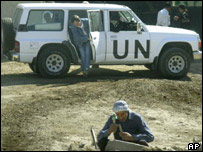
Teams of UN weapons inspectors were sent to
Iraq before the war |
Senior UK
Whitehall sources no longer believe weapons of mass destruction will
be found in Iraq, the BBC has learned
BBC political editor Andrew Marr said "very senior sources" in
Whitehall had virtually ruled out the possibility of finding the
weapons.
They believe they did exist - but were hidden or destroyed by
Saddam Hussein before the war.
Former Foreign Secretary Robin Cook said the admissions were a
"dramatic development" and ex-Prime Minister John Major has called
for a full independent inquiry into the basis for war.
Mr Cook, who resigned as leader of the Commons in the run-up to
the war, told BBC Radio 4's Today programme: "Parliament voted for
war because it was told that Saddam did have real weapons of mass
destruction.
 It is essential that the word of
government and the intelligence services is readily accepted
by Parliament and the public It is essential that the word of
government and the intelligence services is readily accepted
by Parliament and the public 
|
"Indeed what the prime minister said on the eve of the war was
that the weapons posed a real and present danger, either because
[Saddam] might use them or because he might pass them to terrorist
groups."
He said it would have been better to have given the UN weapons
inspectors more time to finish their job, rather than rushing to
war.
"We would now know what we're being told, that Saddam did not
have those weapons... and we'd have found out without a war in which
thousands were killed."
If the arms existed but had not been found by coalition forces,
he added, officials should be "unable to go to sleep at night" for
fear the weapons could be falling into terrorists' hands.
US admission
Earlier, Downing Street said the prime minister stood by what he
told a Commons committee.
Mr Blair told MPs then: "I have absolutely no doubt at all that
we will find evidence of weapons of mass destruction programmes."
However, reporters noted his careful language, referring to
weapons programmes rather than the weapons themselves.
 The coalition did not act in Iraq
because we had discovered dramatic new evidence of Iraq's
pursuit of weapons of mass destruction The coalition did not act in Iraq
because we had discovered dramatic new evidence of Iraq's
pursuit of weapons of mass destruction 
US Defence Secretary Donald Rumsfeld
|
Making his inquiry call, Mr Major said he had supported the war,
partly because he knew Iraq had possessed weapons of mass
destruction in the early 1990s.
Like many others, he had accepted the government's warnings but
said "quite a few" of those alerts were now being questioned.
"It has to be cleared up because it is in the government's
interest to clear it up," said Mr Major.
"We are in the middle of the war against terror and nobody knows
what our troops may be asked to do next.
"It is essential that the word of government and the intelligence
services is readily accepted by Parliament and the public."
The latest twist in the weapons row came as the US Defence
Secretary Donald Rumsfeld admitted the US had had no fresh
intelligence about weapons of mass destruction in Iraq before going
to war.
But it saw existing information in a new light after September
11, he told the Senate Armed Services Committee.
And he said weapons would eventually be found in Iraq.
Paper proof
Andrew Marr stressed that government and Whitehall figures were
"still sure" Iraq did have major weapons of mass destruction
programmes before the war.
"The assumption is that Saddam Hussein for whatever reason
destroyed them or hid them beyond finding before the war started,"
he told Today.
"And there's no doubt also in their minds that they will turn up
interviews with scientists, paper documentation and so on.
"But nobody's been killed by paper documentation ever, and it
does change the nature of things."
It was still possible the Iraqi Survey Group - a team of experts
tasked with looking for evidence of weapons - might turn up some
weapons, he said.
"But they're clearly now preparing the ground for that not to be
the case."
Liberal Democrats foreign affairs spokesman Menzies Campbell
urged the government to "come clean" about whether it believed
weapons would be found in Iraq.
Both the Conservatives and Lib Dems want an independent inquiry,
headed by a judge, into the pre-war intelligence.
